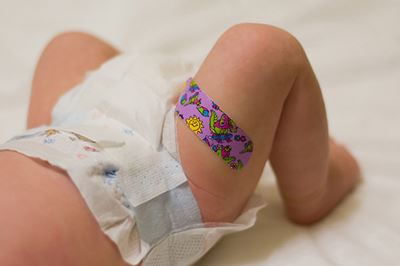Baby's First Shots

Watching your baby get her first vaccinations is usually the hardest part of the two-month checkup. Of course you don’t want to see your baby in pain, and it’s normal to feel a range of emotions during the vaccination process—from anger to guilt to sadness to helplessness. Try to cut through those emotions with the knowledge of why you’re vaccinating. The diseases that vaccines prevent are far worse than the few seconds of discomfort that your baby feels from a shot.
What vaccines will baby get this month?
Most infants can follow the Centers for Disease Control and Prevention’s (CDC) recommendations for vaccination schedules. Your pediatrician may ask a few questions to be sure this is the case, to determine if your baby could be at risk for uncommon diseases, or if she has a health condition that might change the schedule. Regardless, the typical baby receives the following vaccinations at this age:
HepB
This is a series of three shots, first of which takes place in the hospital, after birth. The HepB vaccine protects against the hepatitis B virus, which causes liver infection and sometimes cancer.
DTaP
DTaP stands for diphtheria, tetanus, and pertussis. Diphtheria causes difficulty breathing, paralysis and heart failure. Tetanus is caused by a bacterium that enters a puncture wound (a.k.a the reason why your mom warned you against stepping on rusty nails). It causes pain and stiffness, and it can be fatal. Pertussis, or whooping cough, causes uncontrollable coughing spells that can prevent a baby from being able to eat, drink or even breathe. This disease may cause respiratory arrest or apnea.
Hib
Haemophilus influenzae type b, despite its name, is not the flu. It’s a bacterium that can cause flu-like symptoms, and may lead to meningitis, pneumonia and infection throughout the body.
Polio (IPV)
Most of us have never known anyone, personally, who contracted polio, because it was all but eradicated decades ago. Unfortunately, this paralyzing condition does still exist and has no cure. Vaccination is critical to protect all children and prevent polio from re-entering the United States.
PCV13
This vaccine prevents pneumococcal disease which causes fever, cough, chest pain, pneumonia, meningitis and even infections of the blood and brain.
Rotavirus (RV)
The rotavirus vaccine is a relatively new, compared to other vaccines, which prevents serious gastroenteritis (the “stomach flu”) and its symptoms of severe diarrhea and dehydration. This is an oral vaccine.
This may sound like a lot, and it is, but often these vaccines can be combined to reduce the number of needle sticks. You can comfort your baby (and yourself) during this difficult time by offering your baby a pacifier. When the deed is done, it may be a good time to nurse to offer a little skin-to-skin contact and comfort. Snuggles and soothing sounds from mom or dad can help baby feel better surprisingly quickly.
Talk to your baby's doctor if you have questions or need more information about vaccinations.




